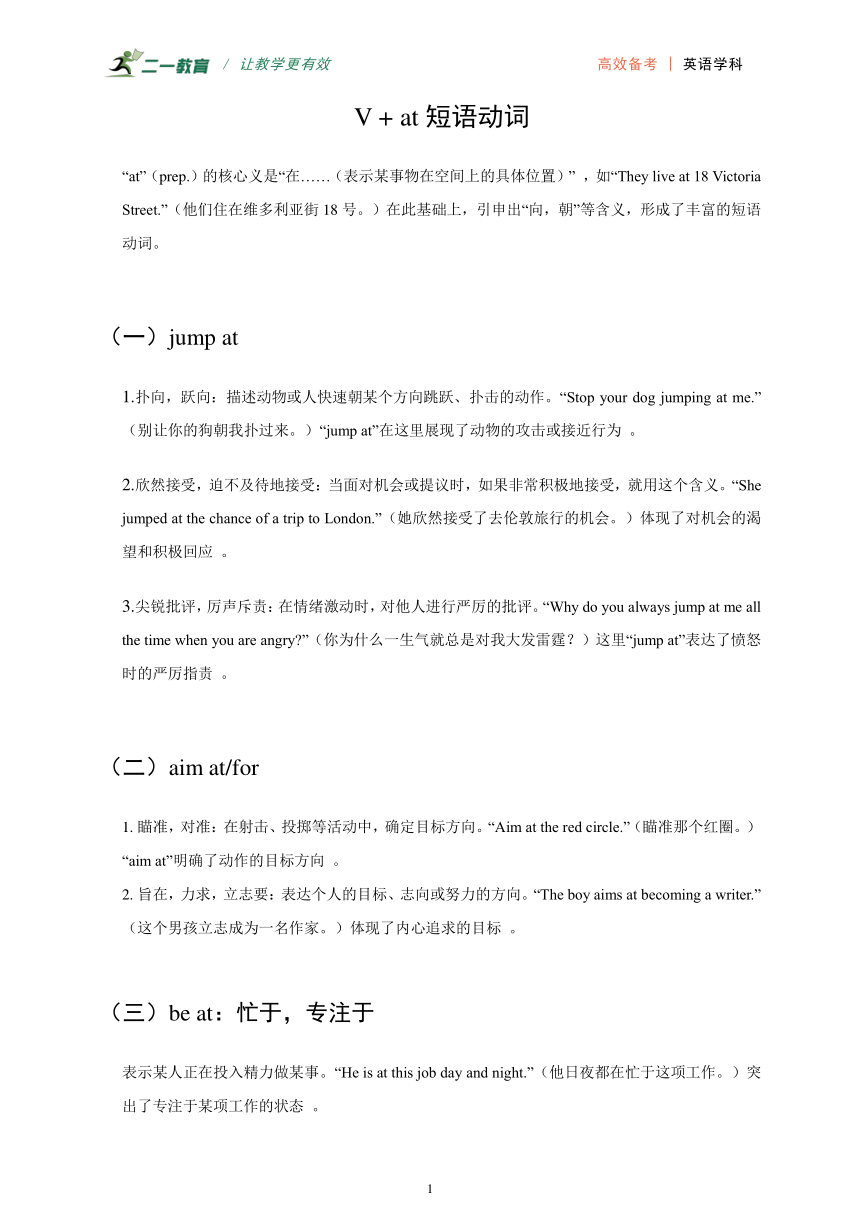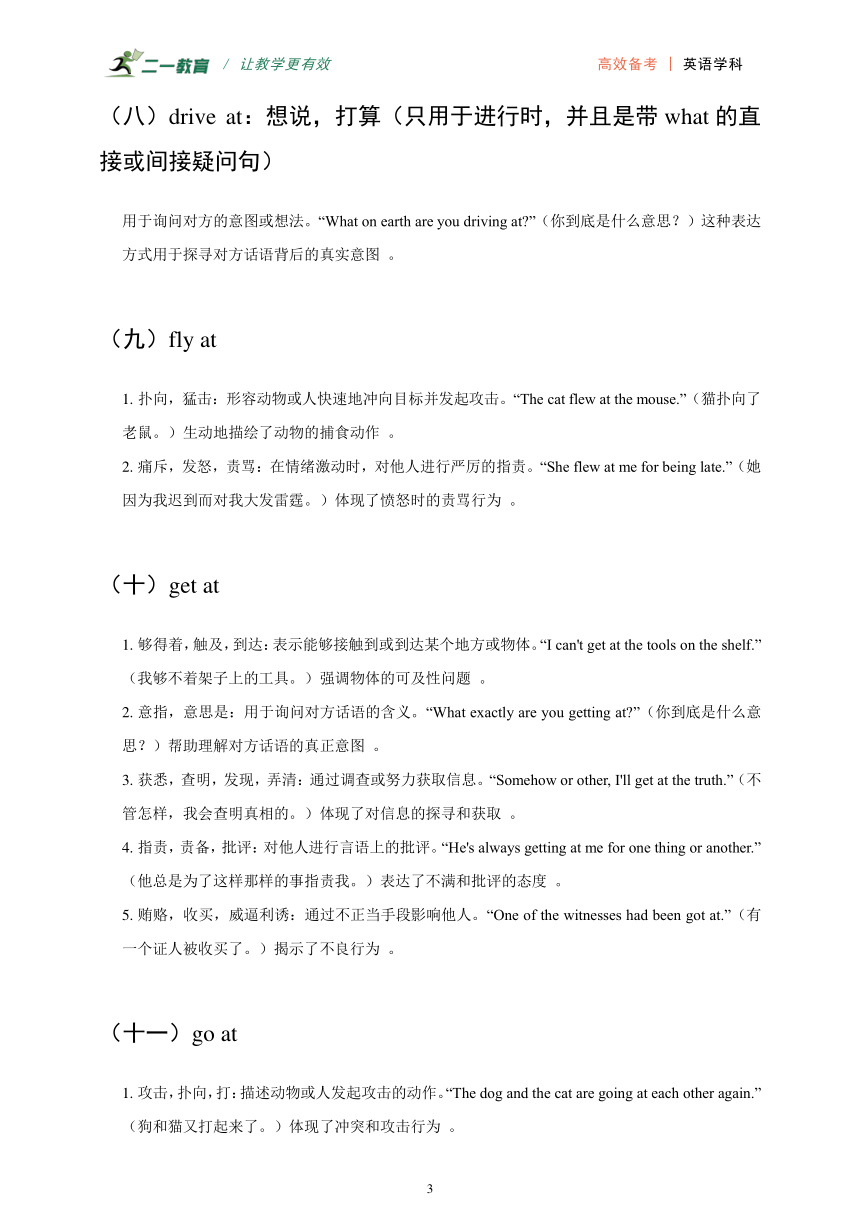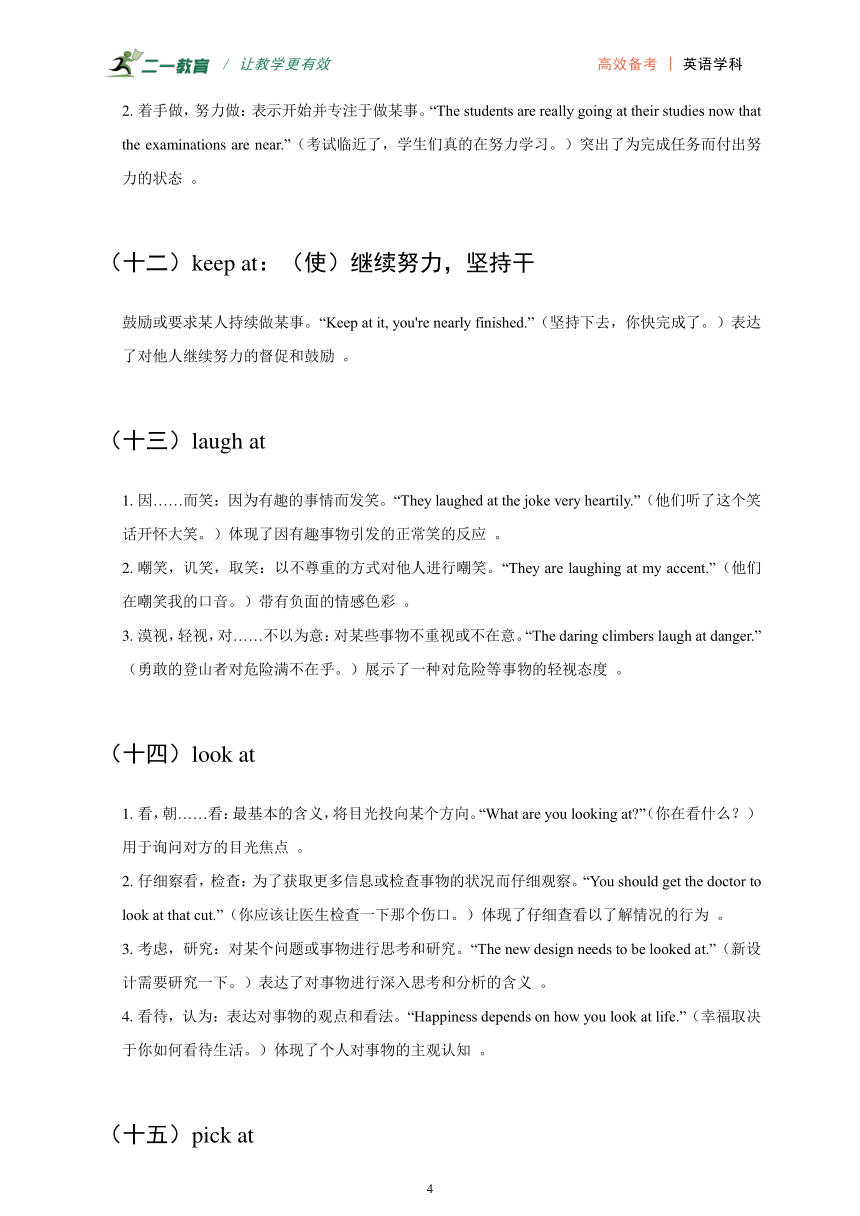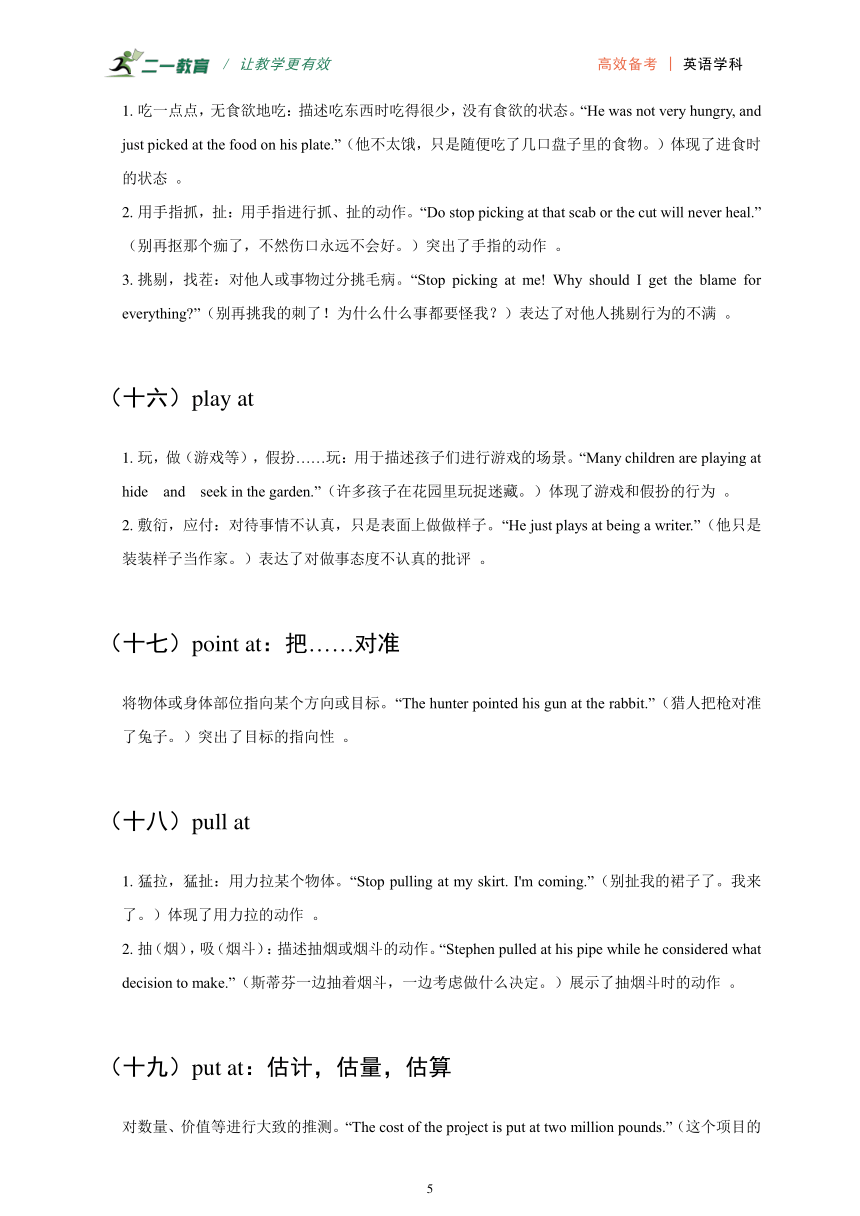05 at动词短语-高中英语高频动词短语速记
文档属性
| 名称 | 05 at动词短语-高中英语高频动词短语速记 |  | |
| 格式 | docx | ||
| 文件大小 | 284.9KB | ||
| 资源类型 | 试卷 | ||
| 版本资源 | 通用版 | ||
| 科目 | 英语 | ||
| 更新时间 | 2025-04-29 16:21:26 | ||
图片预览





文档简介
/ 让教学更有效 高效备考 | 英语学科
V + at短语动词
“at”(prep.)的核心义是“在……(表示某事物在空间上的具体位置)” ,如“They live at 18 Victoria Street.”(他们住在维多利亚街18号。)在此基础上,引申出“向,朝”等含义,形成了丰富的短语动词。
(一)jump at
1.扑向,跃向:描述动物或人快速朝某个方向跳跃、扑击的动作。“Stop your dog jumping at me.”(别让你的狗朝我扑过来。)“jump at”在这里展现了动物的攻击或接近行为 。
2.欣然接受,迫不及待地接受:当面对机会或提议时,如果非常积极地接受,就用这个含义。“She jumped at the chance of a trip to London.”(她欣然接受了去伦敦旅行的机会。)体现了对机会的渴望和积极回应 。
3.尖锐批评,厉声斥责:在情绪激动时,对他人进行严厉的批评。“Why do you always jump at me all the time when you are angry ”(你为什么一生气就总是对我大发雷霆?)这里“jump at”表达了愤怒时的严厉指责 。
(二)aim at/for
瞄准,对准:在射击、投掷等活动中,确定目标方向。“Aim at the red circle.”(瞄准那个红圈。)“aim at”明确了动作的目标方向 。
旨在,力求,立志要:表达个人的目标、志向或努力的方向。“The boy aims at becoming a writer.”(这个男孩立志成为一名作家。)体现了内心追求的目标 。
(三)be at:忙于,专注于
表示某人正在投入精力做某事。“He is at this job day and night.”(他日夜都在忙于这项工作。)突出了专注于某项工作的状态 。
(四)catch at:试图抓住,拼命抓
在紧急或想要获取某物的情况下,做出抓取的动作。“The drowning man tried to catch at a branch but couldn't reach.”(溺水的人试图抓住一根树枝,但够不着。)描绘了人在危险中求生的动作 。
(五)claw at:(用爪子或指甲)抓、撕
常用于描述动物用爪子或人用指甲进行抓、撕的动作。“The cat was clawing at the door.”(猫在抓门。)形象地展现了动物的行为 。
(六)come at
攻击,袭击,冲向:描述野兽、暴力等向某人或某物发起进攻。“If any beast comes at you, I'll help you.”(如果有野兽向你扑来,我会帮你。)体现了危险情境下的攻击行为 。
达到,够得着:表示手、脚等能够触及到某个物体。“Place the medicines where the kids can't come at it.”(把药放在孩子们够不着的地方。)强调物体的可及性 。
获得,了解,掌握:经过努力,在认知或获取方面取得成果。“It was a long time before we came at the truth of the murder.”(过了很长时间我们才了解到谋杀案的真相。)体现了对信息或知识的获取 。
(七)cut at:向……猛击,向……乱砍
描述用工具进行猛烈砍击的动作。“The farmer cut at the snake with a stick.”(农夫用棍子朝蛇猛击。)突出了动作的猛烈和攻击性 。
(八)drive at:想说,打算(只用于进行时,并且是带what的直接或间接疑问句)
用于询问对方的意图或想法。“What on earth are you driving at ”(你到底是什么意思?)这种表达方式用于探寻对方话语背后的真实意图 。
(九)fly at
扑向,猛击:形容动物或人快速地冲向目标并发起攻击。“The cat flew at the mouse.”(猫扑向了老鼠。)生动地描绘了动物的捕食动作 。
痛斥,发怒,责骂:在情绪激动时,对他人进行严厉的指责。“She flew at me for being late.”(她因为我迟到而对我大发雷霆。)体现了愤怒时的责骂行为 。
(十)get at
够得着,触及,到达:表示能够接触到或到达某个地方或物体。“I can't get at the tools on the shelf.”(我够不着架子上的工具。)强调物体的可及性问题 。
意指,意思是:用于询问对方话语的含义。“What exactly are you getting at ”(你到底是什么意思?)帮助理解对方话语的真正意图 。
获悉,查明,发现,弄清:通过调查或努力获取信息。“Somehow or other, I'll get at the truth.”(不管怎样,我会查明真相的。)体现了对信息的探寻和获取 。
指责,责备,批评:对他人进行言语上的批评。“He's always getting at me for one thing or another.”(他总是为了这样那样的事指责我。)表达了不满和批评的态度 。
贿赂,收买,威逼利诱:通过不正当手段影响他人。“One of the witnesses had been got at.”(有一个证人被收买了。)揭示了不良行为 。
(十一)go at
攻击,扑向,打:描述动物或人发起攻击的动作。“The dog and the cat are going at each other again.”(狗和猫又打起来了。)体现了冲突和攻击行为 。
着手做,努力做:表示开始并专注于做某事。“The students are really going at their studies now that the examinations are near.”(考试临近了,学生们真的在努力学习。)突出了为完成任务而付出努力的状态 。
(十二)keep at:(使)继续努力,坚持干
鼓励或要求某人持续做某事。“Keep at it, you're nearly finished.”(坚持下去,你快完成了。)表达了对他人继续努力的督促和鼓励 。
(十三)laugh at
因……而笑:因为有趣的事情而发笑。“They laughed at the joke very heartily.”(他们听了这个笑话开怀大笑。)体现了因有趣事物引发的正常笑的反应 。
嘲笑,讥笑,取笑:以不尊重的方式对他人进行嘲笑。“They are laughing at my accent.”(他们在嘲笑我的口音。)带有负面的情感色彩 。
漠视,轻视,对……不以为意:对某些事物不重视或不在意。“The daring climbers laugh at danger.”(勇敢的登山者对危险满不在乎。)展示了一种对危险等事物的轻视态度 。
(十四)look at
看,朝……看:最基本的含义,将目光投向某个方向。“What are you looking at ”(你在看什么?)用于询问对方的目光焦点 。
仔细察看,检查:为了获取更多信息或检查事物的状况而仔细观察。“You should get the doctor to look at that cut.”(你应该让医生检查一下那个伤口。)体现了仔细查看以了解情况的行为 。
考虑,研究:对某个问题或事物进行思考和研究。“The new design needs to be looked at.”(新设计需要研究一下。)表达了对事物进行深入思考和分析的含义 。
看待,认为:表达对事物的观点和看法。“Happiness depends on how you look at life.”(幸福取决于你如何看待生活。)体现了个人对事物的主观认知 。
(十五)pick at
吃一点点,无食欲地吃:描述吃东西时吃得很少,没有食欲的状态。“He was not very hungry, and just picked at the food on his plate.”(他不太饿,只是随便吃了几口盘子里的食物。)体现了进食时的状态 。
用手指抓,扯:用手指进行抓、扯的动作。“Do stop picking at that scab or the cut will never heal.”(别再抠那个痂了,不然伤口永远不会好。)突出了手指的动作 。
挑剔,找茬:对他人或事物过分挑毛病。“Stop picking at me! Why should I get the blame for everything ”(别再挑我的刺了!为什么什么事都要怪我?)表达了对他人挑剔行为的不满 。
(十六)play at
玩,做(游戏等),假扮……玩:用于描述孩子们进行游戏的场景。“Many children are playing at hide and seek in the garden.”(许多孩子在花园里玩捉迷藏。)体现了游戏和假扮的行为 。
敷衍,应付:对待事情不认真,只是表面上做做样子。“He just plays at being a writer.”(他只是装装样子当作家。)表达了对做事态度不认真的批评 。
(十七)point at:把……对准
将物体或身体部位指向某个方向或目标。“The hunter pointed his gun at the rabbit.”(猎人把枪对准了兔子。)突出了目标的指向性 。
(十八)pull at
猛拉,猛扯:用力拉某个物体。“Stop pulling at my skirt. I'm coming.”(别扯我的裙子了。我来了。)体现了用力拉的动作 。
抽(烟),吸(烟斗):描述抽烟或烟斗的动作。“Stephen pulled at his pipe while he considered what decision to make.”(斯蒂芬一边抽着烟斗,一边考虑做什么决定。)展示了抽烟斗时的动作 。
(十九)put at:估计,估量,估算
对数量、价值等进行大致的推测。“The cost of the project is put at two million pounds.”(这个项目的成本估计为200万英镑。)体现了对数值的预估 。
(二十)run at
向……扑去,攻击……:描述快速冲向目标并发起攻击的动作。“The dog ran at the visitor and bit him.”(狗冲向访客并咬了他。)展示了动物的攻击行为 。
达到,接近(某种水平或比率):用于描述数值或情况达到一定的程度。“Interest rates were running at record levels.”(利率达到了创纪录的水平。)体现了数值的变化和达到的状态 。
(二十一)shoot at
对准……射击,向……射击:在射击场景中,确定射击的目标。“He shot at a bird but missed it.”(他朝一只鸟开枪,但没打中。)突出了射击的动作和目标 。
力争达到,努力获取:将目标视为射击的对象,努力去实现。“They are shooting at new goals.”(他们在努力实现新目标。)表达了为实现目标而努力的含义 。
(二十二)shout at:对……大声说,对……大喊
在情绪激动或需要引起对方注意时,大声说话。“Don't shout at me. It's not my fault.”(别对我大喊大叫。这不是我的错。)体现了情绪和言语的表达 。
(二十三)stick at
坚持干,继续努力做:鼓励在面对困难时不放弃,持续努力。“Learning any skill is largely a matter of sticking at it until you can do it better.”(学习任何技能在很大程度上都需要坚持,直到你能做得更好。)强调坚持的重要性 。
顾忌……,对……犹豫(常用于否定句):表示在做某事时有所顾虑。“He wouldn't stick at cheating to get what he wanted.”(为了得到他想要的东西,他会不择手段。)体现了在道德或行为准则方面的态度 。
(二十四)strike at
向……打,向……击去:用手、工具等向目标发起攻击。“She screamed and struck at the bear with a stick.”(她尖叫着用棍子向熊打去。)展示了攻击的动作 。
攻击,抨击:用言语或文字对他人或事物进行批评。“Many newspapers struck at his latest speech.”(许多报纸对他最近的演讲进行了抨击。)体现了批评和攻击的含义 。
(二十五)talk at:对某人大发议论
不顾对方反应,自顾自地对某人发表长篇大论。“I don't like the way he talks at me.”(我不喜欢他对我大发议论的样子。)表达了对这种交流方式的不满 。
(二十六)tear at:猛力撕扯,用力撕打
用很大的力气进行撕扯或打斗。“The children were screaming and tearing at each other's hair.”(孩子们尖叫着,互相撕扯着头发。)形象地描绘了激烈的冲突场景 。
(二十七) throw at
猛地扑向,冲向
词源逻辑:“throw” 有 “投,掷,抛” 之意,“at” 表示 “向,朝”,组合起来从 “暴力、袭击等朝…投去” 引申出 “猛地扑向,冲向” 的含义。
例句:“The dogs threw themselves at the gate.”,意思是狗猛地冲向大门,形象地描绘出狗的激烈动作 。
对…大献殷勤,拼命讨好
词源逻辑:由 “throw”(投,掷,抛)和 “at”(向,朝),从 “把心抛向某人” 衍生出此含义。
例句:“Everyone could see that she was just throwing herself at him.”,表明大家都看得出她在拼命讨好他 。
touch at (船)靠岸,短暂停靠
词源逻辑:“touch” 是 “接触”,“at” 为 “向,朝”,“船朝口岸接触” 进而得出 “(船)靠岸,短暂停靠” 的意思。
例句:“Our ship touched at several ports on the return voyage.”,即我们的船在返航途中在几个港口停靠,描述了船的航行停靠情况 。
train at (枪、炮、相机)对准,瞄准
词源逻辑:“train” 有 “训练” 之意,“at” 表示 “向,朝”,从 “朝目标物训练” 引申出此义。
例句:“His gun was trained at me.”,说明他用枪瞄准了我,体现了该短语在实际场景中的应用 。
wave at/to (向某人)挥手示意,挥臂致意
词源逻辑:“wave” 是 “挥手”,“at/to” 表示 “向”,所以组合起来就是 “向(某人)挥手示意,挥臂致意”。
例句:“Paul waved at us.”,意思是保罗向我们挥手,展示了日常打招呼的场景 。
wonder at 对…感到惊讶,对…感到诧异
词源逻辑:“wonder” 表示 “惊讶”,“at” 为 “向,朝”,从 “惊讶的表情朝向…” 引申出此含义。
例句:“I wonder at his rudeness.”,即我对他的粗鲁感到惊讶,表达了对某种行为的情感反应 。
work at从事于,致力于
词源逻辑:“work” 是 “工作”,“at” 表示 “向,朝”,“朝…工作着” 从而得出 “从事于,致力于” 的意思。
例句:“You will never learn English well, unless you work at it.”,强调除非致力于学习英语,否则学不好,突出该短语在学习、工作等情境中的应用 。
故事法巧记短语
故事一:森林冒险
Last weekend, a group of high - school students decided to go on an adventure in the nearby forest. They were excited but a bit nervous as they entered the forest.
As they walked deeper, they suddenly heard a strange noise. Tom, the bravest one, aimed at (瞄准) the direction of the noise with his flashlight. Just then, a wild dog came at (攻击,袭击,冲向) them. Everyone was scared. Jack shouted at (对……大声说) the dog, trying to scare it away, but it didn't work. The dog jumped at (扑向,跃向) Tom, and Tom quickly tried to catch at (试图抓住,拼命抓) a stick to defend himself.
Luckily, the dog was stopped by a thick branch. After the scare, they continued their journey. They found a small cave and decided to look at (仔细察看,检查) it. Inside the cave, they saw some strange marks on the wall. They started to wonder at (对…感到惊讶,对…感到诧异) what could have made those marks.
While they were exploring, they found a box. They tried to get at (获悉,查明,发现,弄清) what was inside. Some students thought it might be treasure, so they were eager to open it. But others were a bit worried. Finally, they opened the box and found some old coins. They put at (估计,估量,估算) the value of the coins, but no one was sure.
On their way back, they met a kind old man. He was working at (从事于,致力于) collecting firewood. The students told him about their adventure. The old man laughed at (因……而笑) their excitement and shared some interesting stories about the forest.
When they got home, they couldn't wait to tell their friends about the amazing things they had experienced in the forest. They all agreed that it was a great adventure and they learned a lot from it.
**中文翻译**:上周末,一群高中生决定去附近的森林冒险。进入森林时,他们既兴奋又有点紧张。
他们越往里走,突然听到一阵奇怪的声音。最勇敢的汤姆用手电筒瞄准声音传来的方向。就在这时,一只野狗向他们扑来。大家都吓坏了。杰克对着狗大喊,试图把它吓跑,但没有用。狗朝汤姆扑去,汤姆迅速伸手去抓一根棍子自卫。
幸运的是,狗被一根粗树枝挡住了。惊吓过后,他们继续前行。他们发现了一个小山洞,决定进去查看一番。在山洞里,他们看到墙上有一些奇怪的痕迹。他们开始对这些痕迹的由来感到惊讶。
在探索的时候,他们发现了一个盒子。他们试图弄清楚里面装的是什么。一些学生认为可能是宝藏,所以他们迫不及待地想打开它。但也有一些学生有点担心。最后,他们打开了盒子,发现了一些古币。他们估算了一下这些古币的价值,但没人能确定。
在回去的路上,他们遇到了一位善良的老人,他正在砍柴。学生们把他们的冒险经历告诉了老人。老人被他们的兴奋逗笑了,并分享了一些关于这片森林的有趣故事。
回到家后,他们迫不及待地把在森林里经历的奇妙事情告诉了朋友们。他们都认为这是一次很棒的冒险,并且从中学到了很多东西。
故事二:校园运动会
The school sports meeting was coming, and all the students were excited. Each class was busy preparing for it.
In the class, Tom aimed at (旨在,力求,立志要) winning the 100 - meter race. He practiced hard every day. His friends encouraged him to keep at ((使)继续努力,坚持干) it. One day during practice, a little dog ran at (向……扑去,攻击……) him, which made him lose his balance. But Tom didn't give up.
On the day of the sports meeting, the 100 - meter race was about to start. Tom looked at (看,朝……看) the finish line with determination. When the starting gun fired, he rushed forward. He was running so fast that everyone was amazed. Some students shouted at (对……大声说) him, cheering him on.
However, during the race, Tom noticed that his shoelace was loose. He wanted to stop and tie it, but he knew he couldn't. He just picked at (吃一点点,无食欲地吃,这里表示随便应付) the thought and focused on running.
Finally, Tom crossed the finish line first. All his classmates laughed at (因……而笑) their victory and hugged him. The teacher said that Tom's spirit of not giving up was what they should learn. They also learned that in a competition, they should keep at ((使)继续努力,坚持干) their goals and not be distracted by small things.
After the 100 - meter race, there were other events. Some students participated in the high jump, and they aimed at (瞄准) clearing the bar. Others were in the long - distance running, working at (从事于,致力于) building up their endurance. The whole school was filled with the excitement of the sports meeting.
**中文翻译**:学校运动会即将来临,所有学生都很兴奋。每个班级都在忙着准备。
在班里,汤姆立志要赢得100米赛跑。他每天都刻苦训练。他的朋友们鼓励他坚持下去。有一天训练时,一只小狗向他扑来,使他失去了平衡。但汤姆没有放弃。
运动会那天,100米赛跑即将开始。汤姆坚定地望着终点线。发令枪响后,他冲了出去。他跑得飞快,让每个人都惊叹不已。一些学生对着他大喊,为他加油助威。
然而,在比赛过程中,汤姆注意到他的鞋带松了。他想停下来系鞋带,但他知道不能。他只是暂且放下这个念头,专注于跑步。
最后,汤姆第一个冲过了终点线。他所有的同学都为胜利而欢笑,并拥抱了他。老师说汤姆不放弃的精神是他们应该学习的。他们也明白了在比赛中,应该坚持自己的目标,不要被小事分心。
100米赛跑结束后,还有其他项目。一些学生参加跳高,他们瞄准横杆,力求跃过。另一些学生参加长跑,努力锻炼自己的耐力。整个学校都充满了运动会带来的兴奋氛围。
故事三:海边度假
During the summer vacation, a family went to the beach for a holiday. They were all looking forward to having a great time.
When they arrived at the beach, the kids were so excited that they immediately ran at (向……扑去,冲向) the sea. They played at (玩,做(游戏等),假扮……玩) building sandcastles and chasing each other. The parents sat on the beach, looking at (看,朝……看) the beautiful sea and enjoying the sunshine.
Suddenly, a seagull flew at (扑向,猛击) a kid's ice - cream. The kid was shocked and shouted at (对……大声说) the seagull. His sister laughed at (嘲笑,讥笑,取笑) him for being so scared. But then, they decided to play a game to chase the seagulls away. They picked up some small stones and threw at (猛地扑向,冲向,这里表示朝海鸥扔去) the seagulls gently, not really wanting to hurt them.
After a while, they saw a small boat in the distance. The boat touched at ((船)靠岸,短暂停靠) the beach. A fisherman got off the boat with some fresh fish. The kids were curious and went to look at (仔细察看,检查) the fish. The fisherman told them some stories about fishing.
In the evening, as the sun was setting, they sat on the beach, talking about their day. The kids wondered at (对…感到惊讶,对…感到诧异) the beautiful colors of the sunset. They all agreed that it was a wonderful day at the beach. They were looking forward to more fun during their stay.
**中文翻译**:暑假期间,一家人去海边度假。他们都期待着度过一段愉快的时光。
当他们到达海滩时,孩子们兴奋不已,立刻冲向大海。他们玩起了堆沙堡和互相追逐的游戏。父母们坐在沙滩上,望着美丽的大海,享受着阳光。
突然,一只海鸥扑向一个孩子的冰淇淋。孩子吓了一跳,对着海鸥大喊。他的姐姐因为他这么害怕而嘲笑他。不过随后,他们决定玩个游戏把海鸥赶走。他们捡起一些小石子,轻轻地朝海鸥扔去,并不真想伤害它们。
过了一会儿,他们看到远处有一艘小船。小船停靠在海滩边。一位渔夫带着一些新鲜的鱼下了船。孩子们很好奇,就过去查看那些鱼。渔夫给他们讲了一些捕鱼的故事。
晚上,太阳落山时,他们坐在沙滩上,谈论着这一天。孩子们对日落的美丽色彩感到惊叹。他们都认为这是在海滩上美好的一天。他们期待着在度假期间能有更多的乐趣。
21世纪教育网 www.21cnjy.com 精品试卷·第 2 页 (共 2 页)
V + at短语动词
“at”(prep.)的核心义是“在……(表示某事物在空间上的具体位置)” ,如“They live at 18 Victoria Street.”(他们住在维多利亚街18号。)在此基础上,引申出“向,朝”等含义,形成了丰富的短语动词。
(一)jump at
1.扑向,跃向:描述动物或人快速朝某个方向跳跃、扑击的动作。“Stop your dog jumping at me.”(别让你的狗朝我扑过来。)“jump at”在这里展现了动物的攻击或接近行为 。
2.欣然接受,迫不及待地接受:当面对机会或提议时,如果非常积极地接受,就用这个含义。“She jumped at the chance of a trip to London.”(她欣然接受了去伦敦旅行的机会。)体现了对机会的渴望和积极回应 。
3.尖锐批评,厉声斥责:在情绪激动时,对他人进行严厉的批评。“Why do you always jump at me all the time when you are angry ”(你为什么一生气就总是对我大发雷霆?)这里“jump at”表达了愤怒时的严厉指责 。
(二)aim at/for
瞄准,对准:在射击、投掷等活动中,确定目标方向。“Aim at the red circle.”(瞄准那个红圈。)“aim at”明确了动作的目标方向 。
旨在,力求,立志要:表达个人的目标、志向或努力的方向。“The boy aims at becoming a writer.”(这个男孩立志成为一名作家。)体现了内心追求的目标 。
(三)be at:忙于,专注于
表示某人正在投入精力做某事。“He is at this job day and night.”(他日夜都在忙于这项工作。)突出了专注于某项工作的状态 。
(四)catch at:试图抓住,拼命抓
在紧急或想要获取某物的情况下,做出抓取的动作。“The drowning man tried to catch at a branch but couldn't reach.”(溺水的人试图抓住一根树枝,但够不着。)描绘了人在危险中求生的动作 。
(五)claw at:(用爪子或指甲)抓、撕
常用于描述动物用爪子或人用指甲进行抓、撕的动作。“The cat was clawing at the door.”(猫在抓门。)形象地展现了动物的行为 。
(六)come at
攻击,袭击,冲向:描述野兽、暴力等向某人或某物发起进攻。“If any beast comes at you, I'll help you.”(如果有野兽向你扑来,我会帮你。)体现了危险情境下的攻击行为 。
达到,够得着:表示手、脚等能够触及到某个物体。“Place the medicines where the kids can't come at it.”(把药放在孩子们够不着的地方。)强调物体的可及性 。
获得,了解,掌握:经过努力,在认知或获取方面取得成果。“It was a long time before we came at the truth of the murder.”(过了很长时间我们才了解到谋杀案的真相。)体现了对信息或知识的获取 。
(七)cut at:向……猛击,向……乱砍
描述用工具进行猛烈砍击的动作。“The farmer cut at the snake with a stick.”(农夫用棍子朝蛇猛击。)突出了动作的猛烈和攻击性 。
(八)drive at:想说,打算(只用于进行时,并且是带what的直接或间接疑问句)
用于询问对方的意图或想法。“What on earth are you driving at ”(你到底是什么意思?)这种表达方式用于探寻对方话语背后的真实意图 。
(九)fly at
扑向,猛击:形容动物或人快速地冲向目标并发起攻击。“The cat flew at the mouse.”(猫扑向了老鼠。)生动地描绘了动物的捕食动作 。
痛斥,发怒,责骂:在情绪激动时,对他人进行严厉的指责。“She flew at me for being late.”(她因为我迟到而对我大发雷霆。)体现了愤怒时的责骂行为 。
(十)get at
够得着,触及,到达:表示能够接触到或到达某个地方或物体。“I can't get at the tools on the shelf.”(我够不着架子上的工具。)强调物体的可及性问题 。
意指,意思是:用于询问对方话语的含义。“What exactly are you getting at ”(你到底是什么意思?)帮助理解对方话语的真正意图 。
获悉,查明,发现,弄清:通过调查或努力获取信息。“Somehow or other, I'll get at the truth.”(不管怎样,我会查明真相的。)体现了对信息的探寻和获取 。
指责,责备,批评:对他人进行言语上的批评。“He's always getting at me for one thing or another.”(他总是为了这样那样的事指责我。)表达了不满和批评的态度 。
贿赂,收买,威逼利诱:通过不正当手段影响他人。“One of the witnesses had been got at.”(有一个证人被收买了。)揭示了不良行为 。
(十一)go at
攻击,扑向,打:描述动物或人发起攻击的动作。“The dog and the cat are going at each other again.”(狗和猫又打起来了。)体现了冲突和攻击行为 。
着手做,努力做:表示开始并专注于做某事。“The students are really going at their studies now that the examinations are near.”(考试临近了,学生们真的在努力学习。)突出了为完成任务而付出努力的状态 。
(十二)keep at:(使)继续努力,坚持干
鼓励或要求某人持续做某事。“Keep at it, you're nearly finished.”(坚持下去,你快完成了。)表达了对他人继续努力的督促和鼓励 。
(十三)laugh at
因……而笑:因为有趣的事情而发笑。“They laughed at the joke very heartily.”(他们听了这个笑话开怀大笑。)体现了因有趣事物引发的正常笑的反应 。
嘲笑,讥笑,取笑:以不尊重的方式对他人进行嘲笑。“They are laughing at my accent.”(他们在嘲笑我的口音。)带有负面的情感色彩 。
漠视,轻视,对……不以为意:对某些事物不重视或不在意。“The daring climbers laugh at danger.”(勇敢的登山者对危险满不在乎。)展示了一种对危险等事物的轻视态度 。
(十四)look at
看,朝……看:最基本的含义,将目光投向某个方向。“What are you looking at ”(你在看什么?)用于询问对方的目光焦点 。
仔细察看,检查:为了获取更多信息或检查事物的状况而仔细观察。“You should get the doctor to look at that cut.”(你应该让医生检查一下那个伤口。)体现了仔细查看以了解情况的行为 。
考虑,研究:对某个问题或事物进行思考和研究。“The new design needs to be looked at.”(新设计需要研究一下。)表达了对事物进行深入思考和分析的含义 。
看待,认为:表达对事物的观点和看法。“Happiness depends on how you look at life.”(幸福取决于你如何看待生活。)体现了个人对事物的主观认知 。
(十五)pick at
吃一点点,无食欲地吃:描述吃东西时吃得很少,没有食欲的状态。“He was not very hungry, and just picked at the food on his plate.”(他不太饿,只是随便吃了几口盘子里的食物。)体现了进食时的状态 。
用手指抓,扯:用手指进行抓、扯的动作。“Do stop picking at that scab or the cut will never heal.”(别再抠那个痂了,不然伤口永远不会好。)突出了手指的动作 。
挑剔,找茬:对他人或事物过分挑毛病。“Stop picking at me! Why should I get the blame for everything ”(别再挑我的刺了!为什么什么事都要怪我?)表达了对他人挑剔行为的不满 。
(十六)play at
玩,做(游戏等),假扮……玩:用于描述孩子们进行游戏的场景。“Many children are playing at hide and seek in the garden.”(许多孩子在花园里玩捉迷藏。)体现了游戏和假扮的行为 。
敷衍,应付:对待事情不认真,只是表面上做做样子。“He just plays at being a writer.”(他只是装装样子当作家。)表达了对做事态度不认真的批评 。
(十七)point at:把……对准
将物体或身体部位指向某个方向或目标。“The hunter pointed his gun at the rabbit.”(猎人把枪对准了兔子。)突出了目标的指向性 。
(十八)pull at
猛拉,猛扯:用力拉某个物体。“Stop pulling at my skirt. I'm coming.”(别扯我的裙子了。我来了。)体现了用力拉的动作 。
抽(烟),吸(烟斗):描述抽烟或烟斗的动作。“Stephen pulled at his pipe while he considered what decision to make.”(斯蒂芬一边抽着烟斗,一边考虑做什么决定。)展示了抽烟斗时的动作 。
(十九)put at:估计,估量,估算
对数量、价值等进行大致的推测。“The cost of the project is put at two million pounds.”(这个项目的成本估计为200万英镑。)体现了对数值的预估 。
(二十)run at
向……扑去,攻击……:描述快速冲向目标并发起攻击的动作。“The dog ran at the visitor and bit him.”(狗冲向访客并咬了他。)展示了动物的攻击行为 。
达到,接近(某种水平或比率):用于描述数值或情况达到一定的程度。“Interest rates were running at record levels.”(利率达到了创纪录的水平。)体现了数值的变化和达到的状态 。
(二十一)shoot at
对准……射击,向……射击:在射击场景中,确定射击的目标。“He shot at a bird but missed it.”(他朝一只鸟开枪,但没打中。)突出了射击的动作和目标 。
力争达到,努力获取:将目标视为射击的对象,努力去实现。“They are shooting at new goals.”(他们在努力实现新目标。)表达了为实现目标而努力的含义 。
(二十二)shout at:对……大声说,对……大喊
在情绪激动或需要引起对方注意时,大声说话。“Don't shout at me. It's not my fault.”(别对我大喊大叫。这不是我的错。)体现了情绪和言语的表达 。
(二十三)stick at
坚持干,继续努力做:鼓励在面对困难时不放弃,持续努力。“Learning any skill is largely a matter of sticking at it until you can do it better.”(学习任何技能在很大程度上都需要坚持,直到你能做得更好。)强调坚持的重要性 。
顾忌……,对……犹豫(常用于否定句):表示在做某事时有所顾虑。“He wouldn't stick at cheating to get what he wanted.”(为了得到他想要的东西,他会不择手段。)体现了在道德或行为准则方面的态度 。
(二十四)strike at
向……打,向……击去:用手、工具等向目标发起攻击。“She screamed and struck at the bear with a stick.”(她尖叫着用棍子向熊打去。)展示了攻击的动作 。
攻击,抨击:用言语或文字对他人或事物进行批评。“Many newspapers struck at his latest speech.”(许多报纸对他最近的演讲进行了抨击。)体现了批评和攻击的含义 。
(二十五)talk at:对某人大发议论
不顾对方反应,自顾自地对某人发表长篇大论。“I don't like the way he talks at me.”(我不喜欢他对我大发议论的样子。)表达了对这种交流方式的不满 。
(二十六)tear at:猛力撕扯,用力撕打
用很大的力气进行撕扯或打斗。“The children were screaming and tearing at each other's hair.”(孩子们尖叫着,互相撕扯着头发。)形象地描绘了激烈的冲突场景 。
(二十七) throw at
猛地扑向,冲向
词源逻辑:“throw” 有 “投,掷,抛” 之意,“at” 表示 “向,朝”,组合起来从 “暴力、袭击等朝…投去” 引申出 “猛地扑向,冲向” 的含义。
例句:“The dogs threw themselves at the gate.”,意思是狗猛地冲向大门,形象地描绘出狗的激烈动作 。
对…大献殷勤,拼命讨好
词源逻辑:由 “throw”(投,掷,抛)和 “at”(向,朝),从 “把心抛向某人” 衍生出此含义。
例句:“Everyone could see that she was just throwing herself at him.”,表明大家都看得出她在拼命讨好他 。
touch at (船)靠岸,短暂停靠
词源逻辑:“touch” 是 “接触”,“at” 为 “向,朝”,“船朝口岸接触” 进而得出 “(船)靠岸,短暂停靠” 的意思。
例句:“Our ship touched at several ports on the return voyage.”,即我们的船在返航途中在几个港口停靠,描述了船的航行停靠情况 。
train at (枪、炮、相机)对准,瞄准
词源逻辑:“train” 有 “训练” 之意,“at” 表示 “向,朝”,从 “朝目标物训练” 引申出此义。
例句:“His gun was trained at me.”,说明他用枪瞄准了我,体现了该短语在实际场景中的应用 。
wave at/to (向某人)挥手示意,挥臂致意
词源逻辑:“wave” 是 “挥手”,“at/to” 表示 “向”,所以组合起来就是 “向(某人)挥手示意,挥臂致意”。
例句:“Paul waved at us.”,意思是保罗向我们挥手,展示了日常打招呼的场景 。
wonder at 对…感到惊讶,对…感到诧异
词源逻辑:“wonder” 表示 “惊讶”,“at” 为 “向,朝”,从 “惊讶的表情朝向…” 引申出此含义。
例句:“I wonder at his rudeness.”,即我对他的粗鲁感到惊讶,表达了对某种行为的情感反应 。
work at从事于,致力于
词源逻辑:“work” 是 “工作”,“at” 表示 “向,朝”,“朝…工作着” 从而得出 “从事于,致力于” 的意思。
例句:“You will never learn English well, unless you work at it.”,强调除非致力于学习英语,否则学不好,突出该短语在学习、工作等情境中的应用 。
故事法巧记短语
故事一:森林冒险
Last weekend, a group of high - school students decided to go on an adventure in the nearby forest. They were excited but a bit nervous as they entered the forest.
As they walked deeper, they suddenly heard a strange noise. Tom, the bravest one, aimed at (瞄准) the direction of the noise with his flashlight. Just then, a wild dog came at (攻击,袭击,冲向) them. Everyone was scared. Jack shouted at (对……大声说) the dog, trying to scare it away, but it didn't work. The dog jumped at (扑向,跃向) Tom, and Tom quickly tried to catch at (试图抓住,拼命抓) a stick to defend himself.
Luckily, the dog was stopped by a thick branch. After the scare, they continued their journey. They found a small cave and decided to look at (仔细察看,检查) it. Inside the cave, they saw some strange marks on the wall. They started to wonder at (对…感到惊讶,对…感到诧异) what could have made those marks.
While they were exploring, they found a box. They tried to get at (获悉,查明,发现,弄清) what was inside. Some students thought it might be treasure, so they were eager to open it. But others were a bit worried. Finally, they opened the box and found some old coins. They put at (估计,估量,估算) the value of the coins, but no one was sure.
On their way back, they met a kind old man. He was working at (从事于,致力于) collecting firewood. The students told him about their adventure. The old man laughed at (因……而笑) their excitement and shared some interesting stories about the forest.
When they got home, they couldn't wait to tell their friends about the amazing things they had experienced in the forest. They all agreed that it was a great adventure and they learned a lot from it.
**中文翻译**:上周末,一群高中生决定去附近的森林冒险。进入森林时,他们既兴奋又有点紧张。
他们越往里走,突然听到一阵奇怪的声音。最勇敢的汤姆用手电筒瞄准声音传来的方向。就在这时,一只野狗向他们扑来。大家都吓坏了。杰克对着狗大喊,试图把它吓跑,但没有用。狗朝汤姆扑去,汤姆迅速伸手去抓一根棍子自卫。
幸运的是,狗被一根粗树枝挡住了。惊吓过后,他们继续前行。他们发现了一个小山洞,决定进去查看一番。在山洞里,他们看到墙上有一些奇怪的痕迹。他们开始对这些痕迹的由来感到惊讶。
在探索的时候,他们发现了一个盒子。他们试图弄清楚里面装的是什么。一些学生认为可能是宝藏,所以他们迫不及待地想打开它。但也有一些学生有点担心。最后,他们打开了盒子,发现了一些古币。他们估算了一下这些古币的价值,但没人能确定。
在回去的路上,他们遇到了一位善良的老人,他正在砍柴。学生们把他们的冒险经历告诉了老人。老人被他们的兴奋逗笑了,并分享了一些关于这片森林的有趣故事。
回到家后,他们迫不及待地把在森林里经历的奇妙事情告诉了朋友们。他们都认为这是一次很棒的冒险,并且从中学到了很多东西。
故事二:校园运动会
The school sports meeting was coming, and all the students were excited. Each class was busy preparing for it.
In the class, Tom aimed at (旨在,力求,立志要) winning the 100 - meter race. He practiced hard every day. His friends encouraged him to keep at ((使)继续努力,坚持干) it. One day during practice, a little dog ran at (向……扑去,攻击……) him, which made him lose his balance. But Tom didn't give up.
On the day of the sports meeting, the 100 - meter race was about to start. Tom looked at (看,朝……看) the finish line with determination. When the starting gun fired, he rushed forward. He was running so fast that everyone was amazed. Some students shouted at (对……大声说) him, cheering him on.
However, during the race, Tom noticed that his shoelace was loose. He wanted to stop and tie it, but he knew he couldn't. He just picked at (吃一点点,无食欲地吃,这里表示随便应付) the thought and focused on running.
Finally, Tom crossed the finish line first. All his classmates laughed at (因……而笑) their victory and hugged him. The teacher said that Tom's spirit of not giving up was what they should learn. They also learned that in a competition, they should keep at ((使)继续努力,坚持干) their goals and not be distracted by small things.
After the 100 - meter race, there were other events. Some students participated in the high jump, and they aimed at (瞄准) clearing the bar. Others were in the long - distance running, working at (从事于,致力于) building up their endurance. The whole school was filled with the excitement of the sports meeting.
**中文翻译**:学校运动会即将来临,所有学生都很兴奋。每个班级都在忙着准备。
在班里,汤姆立志要赢得100米赛跑。他每天都刻苦训练。他的朋友们鼓励他坚持下去。有一天训练时,一只小狗向他扑来,使他失去了平衡。但汤姆没有放弃。
运动会那天,100米赛跑即将开始。汤姆坚定地望着终点线。发令枪响后,他冲了出去。他跑得飞快,让每个人都惊叹不已。一些学生对着他大喊,为他加油助威。
然而,在比赛过程中,汤姆注意到他的鞋带松了。他想停下来系鞋带,但他知道不能。他只是暂且放下这个念头,专注于跑步。
最后,汤姆第一个冲过了终点线。他所有的同学都为胜利而欢笑,并拥抱了他。老师说汤姆不放弃的精神是他们应该学习的。他们也明白了在比赛中,应该坚持自己的目标,不要被小事分心。
100米赛跑结束后,还有其他项目。一些学生参加跳高,他们瞄准横杆,力求跃过。另一些学生参加长跑,努力锻炼自己的耐力。整个学校都充满了运动会带来的兴奋氛围。
故事三:海边度假
During the summer vacation, a family went to the beach for a holiday. They were all looking forward to having a great time.
When they arrived at the beach, the kids were so excited that they immediately ran at (向……扑去,冲向) the sea. They played at (玩,做(游戏等),假扮……玩) building sandcastles and chasing each other. The parents sat on the beach, looking at (看,朝……看) the beautiful sea and enjoying the sunshine.
Suddenly, a seagull flew at (扑向,猛击) a kid's ice - cream. The kid was shocked and shouted at (对……大声说) the seagull. His sister laughed at (嘲笑,讥笑,取笑) him for being so scared. But then, they decided to play a game to chase the seagulls away. They picked up some small stones and threw at (猛地扑向,冲向,这里表示朝海鸥扔去) the seagulls gently, not really wanting to hurt them.
After a while, they saw a small boat in the distance. The boat touched at ((船)靠岸,短暂停靠) the beach. A fisherman got off the boat with some fresh fish. The kids were curious and went to look at (仔细察看,检查) the fish. The fisherman told them some stories about fishing.
In the evening, as the sun was setting, they sat on the beach, talking about their day. The kids wondered at (对…感到惊讶,对…感到诧异) the beautiful colors of the sunset. They all agreed that it was a wonderful day at the beach. They were looking forward to more fun during their stay.
**中文翻译**:暑假期间,一家人去海边度假。他们都期待着度过一段愉快的时光。
当他们到达海滩时,孩子们兴奋不已,立刻冲向大海。他们玩起了堆沙堡和互相追逐的游戏。父母们坐在沙滩上,望着美丽的大海,享受着阳光。
突然,一只海鸥扑向一个孩子的冰淇淋。孩子吓了一跳,对着海鸥大喊。他的姐姐因为他这么害怕而嘲笑他。不过随后,他们决定玩个游戏把海鸥赶走。他们捡起一些小石子,轻轻地朝海鸥扔去,并不真想伤害它们。
过了一会儿,他们看到远处有一艘小船。小船停靠在海滩边。一位渔夫带着一些新鲜的鱼下了船。孩子们很好奇,就过去查看那些鱼。渔夫给他们讲了一些捕鱼的故事。
晚上,太阳落山时,他们坐在沙滩上,谈论着这一天。孩子们对日落的美丽色彩感到惊叹。他们都认为这是在海滩上美好的一天。他们期待着在度假期间能有更多的乐趣。
21世纪教育网 www.21cnjy.com 精品试卷·第 2 页 (共 2 页)
